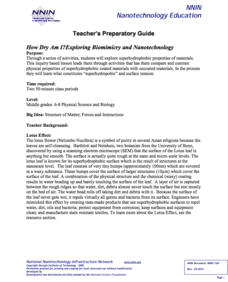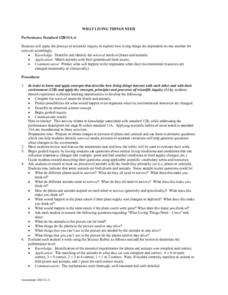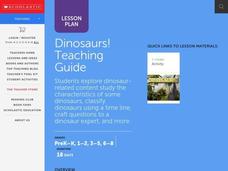Columbus City Schools
Planet X
How did the earth become the mass that it is now? Your young scientists explore this question through the concept of density. Their inquiries consider the impact of gravity on the formation of planets. The culminating activity of the...
Cornell University
Beam Focusing Using Lenses
Explore optics using an inquiry-based experimental approach! Young scholars use a set of materials to design and build a unit capable of focusing a beam of light. They experiment with different lenses to determine the best approach to...
Royal Society of Chemistry
A Solid-Solid Reaction between Lead Nitrate and Potassium Iodide
Why is it so difficult to make two solid compounds react? Investigate the concepts of particle collisions and rate of reaction using a quick demonstration. The colorful experiment features two plain, white solids combining to form a...
National Nanotechnology Infrastructure Network
How Dry am I? Exploring Biomimicry and Nanotechnology
Help your classes feel like they can walk on water! An engaging inquiry-based lesson has young scholars experiment with different surface coatings. They make observations about their properties and how they relate to the surface tension...
Project Maths
Introduction to Calculus
Don't let your class's heart rates rise as you introduce them to differentiation ... an inquiry-based lesson helps them keep it in check! The second lesson in a three-part series asks learners to analyze the rate of change of different...
Open Oregon Educational Resources
General Biology I: Survey of Cellular Biology (Mt Hood Community College Biology 101)
From the scientific method to the function of a cell, the eBook has it all. A useful resource provides a free biology textbook with a focus on context. The text begins with an overview of the process of scientific inquiry and biology...
US National Archives
Eastern Europe 1939-45 — Ukraine
Was Joseph Stalin desperate or exaggerating the USSR's need for assistance on the Eastern Front in 1942? History students examine two differing opinions on Stalin's position and the reality of the Eastern Front just three years before...
US National Archives
WWII: Asia 1939-45 – Burma
Because World War II encompassed most of the globe in one way or another, many pivotal battles and events are not as visible in the history books, leaving veterans of these conflicts feeling overlooked by more famous skirmishes. High...
Curated OER
Analysis of Grooming Behavior in Drosophila melanogaster
Young scholars engage in a lab that focuses on animal behavior in an open ended inquiry based laboratory experience. They build an ethogram, display a transition matrix and analyze a Markov Chain. They remove wings from the drosophila...
Curated OER
What Living Things Need
Students apply the process of scientific inquiry to explore how living things are dependent on one another for survival. They match animals with their generalized food source. Students predict what happens to the organisms when their...
Curated OER
What Do Parts Do?
Students review the components of the scientific inquiry method. In groups, they identify and describe the components and functions of all of the parts of a plant. Using a diagram, they label the parts of the plant chosen and share...
Curated OER
Science is a Wonderland
Students use the scientific method to study Animalia and Plantae Kingdoms. In this science inquiry lesson, students watch a PowerPoint about science process skills. Students complete the National Geographic bottled Eggs-periment or the...
Curated OER
Science Lab Skills
Learners develop problem solving, decision-making and inquiry skills by planning experiments. They conduct systematic observations, interpret and analyze data and draw conclusions then communicate their results.
Curated OER
Hey, I've Got A Question!
Seventh graders explore the Solar System. They develop a research question and use inquiry-based research skills to find the answers to their questions. Students write up their findings and create a multimedia presentation.
Curated OER
Dinosaurs
Students will develop goals for inquiry. They will also improve content area reading and research skills. The context of studying dinosaurs will help learners to distinguish from organisms that live presently and those from the past...
Curated OER
The UPS Experiment
Students calculate the speed using metric measurements. In this geometry lesson, students calculate speed, distance and velocity using metric measurements. They gain inquiry and problem solving skills in this assignment.
Curated OER
Current Thinking About Magnets
Students construct their own magnet and wire device. In this inquiry instructional activity, students investigate the factors affecting the strength of magnetic forces. They manipulate different variable to determine their effect.
Curated OER
Beginning Statistical Inquiries into the Scientific Method: Jelly-Side-Down
Students describe what happens when a piece of jellied toast is dropped off a table. From these observations, students pose a question concerning which side of the jellied toast land on the floor.
Curated OER
The Blue Bottle: An Example of Teacher-Guided Inquiry
Learners observe a demonstration in which a bottle containing a colorless solution is mixed, turns blue, then becomes colorless again. They record observations, form and discuss hypotheses, and draw a conclusion based on the evidence.
Curated OER
Scientific Inquiry
Students create a poster. In this recycling lesson, students discuss pollution and the ways humans negatively affect the environment. Students describe examples of litter or pollution they have experienced. Students collect litter from...
Curated OER
Formulate an Inquiry
Young scholars define questions and issues to be investigated through the photo essay. They practice interviewing skills and write questions defining the topics they want to investigate in their photo essays.
Curated OER
Archaeological Inquiry
Students describe what they see as they observe an "artifact". They draw conclusions based on the information gathered to identify what the artifact might be used for and determine how old it might be.
Curated OER
Galactic Inquiry
Young scholars view NASA images of galaxies and develop a galaxy classification scheme. They compare and contrast their classification scheme with that developed by Edwin Hubble. They recognize that galaxies are collections of billions...
Curated OER
Inquiry in Science Using an Animal Behavior Model
Students observe a planaria without a microscope and with a stereoscopic microscope. They draw the planaria and describe its motion and eating habits. Students research planarias various body systems and behavior. They design an...
Other popular searches
- Inquiry Based Learning
- Inquiry Based
- Scientific Inquiry
- Inquiry Based Cell Biology
- Life Science Inquiry
- Earth Science Inquiry
- Inquiry Based Physics
- Inquiry Lessons
- Science Inquiry
- Inquiry Based Science
- Environmental Inquiry
- Inquiry Based

























